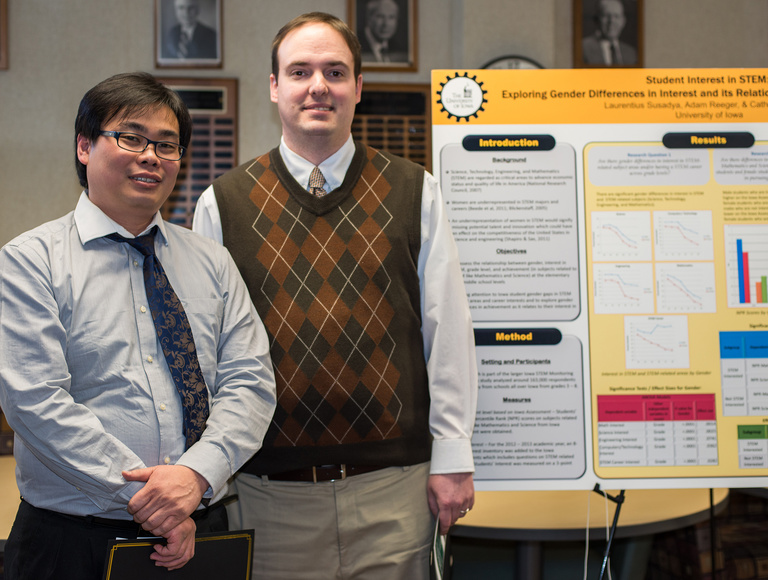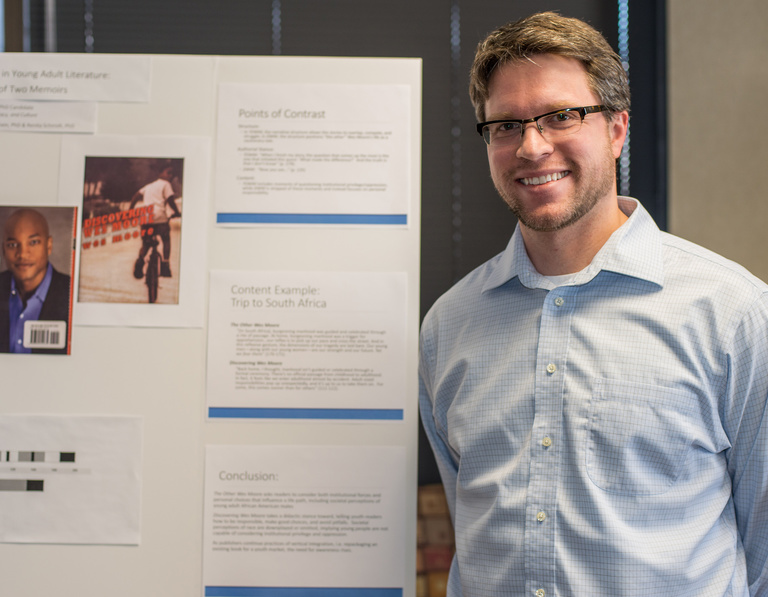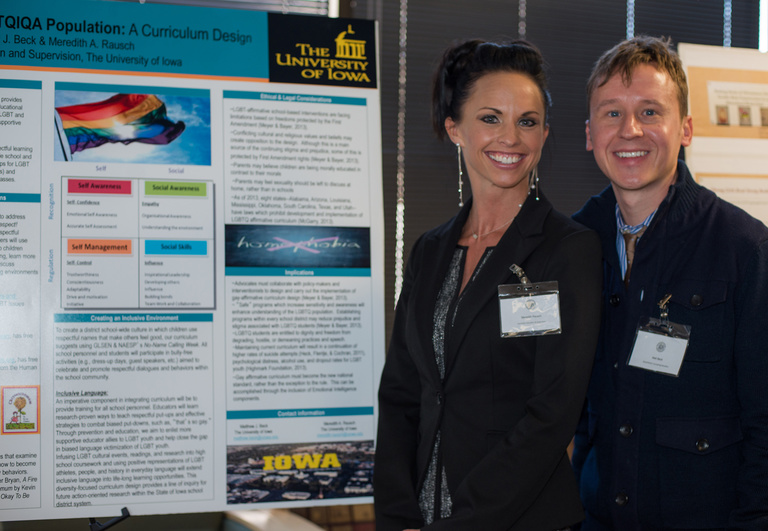
The University of Iowa College of Education hosted its annual Martin Luther King Jr. Research Symposium on Friday, Feb. 7. The event highlighted student research on issues of diversity.
Eleven poster presentations covering topics ranging from student interest in STEM to differences in moral reasoning in a religiously diverse student body were displayed. The top five posters received awards.

The first-place award went to Laurentius Susadya and Adam Reeger for their project, “Student Interest in STEM: Exploring Gender Differences in Interest and its Relationship to Achievement in Iowa.” Susadya and Reeger are both doctoral students in the Educational Measurement and Statistics Program.
Their research explored the gender gap between male and female achievement in STEM-related fields, and compared the achievement gap to men and women who are actually interested in STEM-related careers. They found that in those with an interest in STEM, men score slightly higher, but in those who do not have an interest in STEM, women score higher.
“This is unique research because there are many studies being conducted on STEM and achievement, but not many consider interest as a factor in the gender gap,” says Susadya.

The second-place poster was by Mark Sulzer for his study, “Representation of Race in Young Adult Literature: A Comparison of Two Memoirs.” Sulzer is pursuing a doctoral degree in the Language, Literacy, and Culture Program.
Sulzer studied a memoir published in two different markets. It was originally published in 2010 under the title, The Other Wes Moore: One Name, Two Fates. The memoir traces the life histories of two African American men who both grow up fatherless and from similar neighborhoods. Both men are named Wes Moore, and develop into very different men. This version of the memoir, marketed to an adult audience, is structured to allow readers to think critically throughout the story, while a second version, marketed to youth, has a structure that shapes the story differently and removes the room for critical thinking.
“I'm interested in how publishers market to youth,” Sulzer says. “As a former English language arts teacher, I take the position that the high school English classroom should be a place where students have access to complex views and are encouraged to engage with them authentically.”

Third place went to Matthew Beck and Meredith Rausch for their poster, “Affirmation of the Lesbian, Gay, Bisexual, Transgender, Queer, Intergender, Questioning, Ally (LGBTQIQA) Population: A Curriculum Design.” Beck and Rausch are both pursuing doctorates in the Counselor Education and Supervision Program.
Rausch and Beck designed a curriculum to promote emotional skills such as self-control, empathy, and self-reflection in order to create a safe and welcoming environment for all primary and secondary students. Their curriculum uses current research-based LGBT affirming activities to reduce biased and derogatory language in school environments.
“Our passion with this project is to ensure that our schools and hallways are safe, healthy, and affirming for all our students, including LGBT populations,” says Beck.
Fourth place was awarded to Owen Gaasedelen and Daniel Elchert, doctoral students in the Counseling Psychology Program, for their project, “Differences in Moral Reasoning in a Religiously Diverse Student Population.”
Fifth place was Carla Gonzalez, a doctoral student in the Schools, Culture, and Society Program, for her poster, “On the Other Side of the Tracks: A Single Case Study of a Latina’s Family Educational Experiences in Central Valley, Illinois.”
At the award ceremony of the symposium, UI College of Education Dean Nicholas Colangelo gave a welcoming address, and the keynote address entitled, “Becoming America: Dr. Kings’s Beloved Community” was given by Phil Kutzko, a professor of mathematics in the College of Liberal Arts and Sciences at the University of Iowa.
“This is our best to event to honor student research,” says Colangelo. “We are able to look to the past and honor Martin Luther King, but also look to the future of diversity.”